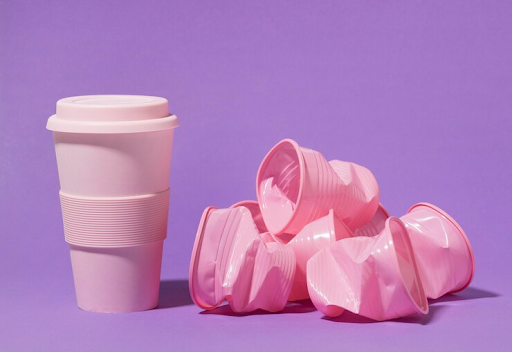Many restaurants and coffee shops provide customers with disposable cups made of Styrofoam or plastic that help maintain an ideal temperature for hot or cold beverages that customers take on the go. Although Styrofoam or plastic cups may be economical and durable, their use has also raised serious health and environmental concerns, prompting consumers to look for alternative solutions. One such choice is biodegradable cups, which provide various advantages compared to their counterparts.
Biodegradable cups comprise renewable resources like corn-based products or wheat straw left over from harvesting crops. The soil can then be fertilized without using artificial fertilizers by recycling their material or turning it into compost. In addition, these cups are often free of harmful substances, which makes them safer than paper and plastic cups that don’t decompose. Switching to environmentally friendly straws, cups, and coffee bags will significantly reduce your carbon footprint.
Everyone should adapt and practice this to make our planet more livable and breathable. Over the coming years, sales of biodegradable cups are expected to increase as more individuals will be more mindful about their carbon footprint. With reusable cups, less waste—paper or plastic—is produced. It’s a win-win situation when you can save the environment and money.
Read Along to Learn About the Advantages of Biodegradable Cups:

1. More Durable than Paper Cups
Even though paper cups offer an interim solution to avoid Styrofoam’s environmental impacts, they come with their own set of problems. Many don’t recycle them, and those who do may struggle to locate an acceptable recycling center. Paper doesn’t provide as much insulation, meaning it may easily spill or leak when handled. Hence, it is advisable to go for biodegradable cups rather than paper or foam ones. They are the best sustainable substitute for paper and foam cups, consisting of non-toxic materials that will naturally decompose.
Furthermore, these environmentally friendly disposable cups are stronger and more resilient than their predecessors, which makes them an excellent means for businesses looking to attract clients with eco-conscious offers to project a green image. They’re microwave-safe, so that heating drinks won’t pose any risk!
2. Good for the Environment
Coffee cups have a unique design that makes them difficult to recycle, and most paper cups have a plastic lining that holds liquid inside and needs to be separated before recycling. This makes it difficult to recycle these cups, which then leads to environmental pollution. Many coffee places are trying to lessen their impact on the environment by switching to biodegradable cups. Contact a leading coffee cup manufacturer to learn about eco-friendly coffee bags and cups. Connect now!
Biodegradable and eco-friendly disposable cups and other products help reduce plastic and paper waste in landfills and oceans. Made of sustainably sourced paper and lined with bioplastic produced using lactobacillus bacteria mixed with sugar to convert sugar to lactic acid, which then forms polylactic acid and can be made into products such as coffee cups.
3. Biodegradable Cups Help Reduce Pollution
If you value eco-friendly disposable cups, bags, and other products, biodegradable paper cups could be your answer. Constructed of paper and polylactic acid (PLA) bioplastic made from fermented plant starch from sugar cane, cassava, or corn sources, they’re fully compostable in industrial facilities or home composting and stronger than most paper products while being leakproof – an added plus. Biodegradable cups are also recyclable, whereas conventional plastic cups take 400 years or longer to break down and leave toxic residues behind. Biodegradable cups can be reused as soil amendments to decrease synthetic fertilizer use.
When searching for coffee cups biodegradable enough to protect the environment, the primary consideration is whether they feature a compostable liner. At the same time, most recycling centers will not accept them as recyclable materials. Luckily, several manufacturers have commercialized cups that are compostable and polyethylene coating-free.
4. Biodegradable Cups are Reusable
Biodegradable coffee cups offer businesses that wish to reduce their environmental impact an alternative that is better for the planet, made without harmful chemicals, and can be reused multiple times before biodegradation occurs. They’re an eco-friendly choice and an excellent reusable option.
Biodegradable cups use less energy in their production process, helping reduce pollution and waste. Furthermore, their production process uses no bleaches or dyes, which makes them completely non-toxic for all generations of drinkers to operate safely.
Misconceptions about biodegradability often arise because people equate this term with eco-friendliness, leading to misleading comparisons. Unfortunately, many eco-friendly cups contain plastic that will remain in our environment forever and cause health concerns. This is why always choose a cup certified by the Biodegradable Products Institute to avoid confusion.
5. Biodegradable Cups are e Recyclable
Most biodegradable cups are recyclable. This means they may be changed into something valuable and utilized again to make useful goods for consumers. They are sustainable and safe to dispose of in the environment since they are non-toxic. Their production requires less energy without polluting either air or water resources as plastic containers can. To learn more about sustainable coffee cups and eco-friendly coffee bags, contact one of the leading coffee bag and cup manufacturers now! You can take their professional guidance in selecting the best-suited cup for your brand.
As an effort to decrease the environmental footprint of paper coffee cups sold over the counter, many different companies are working on developing barrier technologies that enable compostability and biodegradation without industrial compositing, streamlining collection, sorting, recycling, and circular economy by minimizing resource consumption from birth-to-grave as well as carbon emissions.
6. Biodegradable Cups are Microwave Safe
The best part about biodegradable paper cups is that they are microwave-safe. You can immediately put it in your microwave to heat the liquid and enjoy it safely. Eco-friendly cups in your office effectively reduce plastic waste that ends up in landfills and oceans; plus, they’re more durable than paper cups and non-toxic. When purchasing them, ensure they’re made from sustainable materials for maximum environmental benefits. Biodegradable cups are composed of plant starches, cellulose, and paper pulp derived from renewable resources, making them microwave-safe.
Their lining typically consists of PLA, an eco-friendly bioplastic made from corn or sugarcane that’s produced through wet milling; this turns starches into sugar that’s then fermented by bacteria to form lactide molecules before connecting into polylactic acid polymers. Anyone can use and dispose of this biodegradable coffee cup in either commercial compost piles or municipal recycling programs.
7. Biodegradable Cups are Non Toxic
The use of biodegradable paper cups is highly advisable if you are concerned about your carbon footprint and the impact of your consumption on the environment. Many scientists and environmentalists emphasize the usage of eco-disposable cups as they lessen the risks posed to the environment.
Selecting biodegradable cups for your company’s coffee service requirements will enhance its reputation and attract consumers while assisting in the reduction of waste levels in landfills and seas. Several well-known coffee cup manufacturers are switching from disposable to biodegradable cups to lessen their carbon footprint.
Importance of Biodegradable Cups for Coffee
As people become more environmentally aware, many are concerned with the effects plastic and Styrofoam cups have on our environment. Although recyclable options exist for such cups, like recycling centers in certain countries, other solutions offer better environmental protection, such as biodegradable and compostable coffee cups. Biodegradable cups are made of materials that decompose easily, such as paper and bioplastic liners derived from fermented plant starches such as sugar cane, cassava, or corn.
Coffee-certified biodegradable and compostable coffee cups will display a symbol to indicate their eco-friendliness, while this certification also ensures they were made responsibly.
Biodegradable cups not only reduce waste that’s sent to landfills but are also safer options for marine and wildlife life. Plastic from traditional cups could mistaken by marine and terrestrial animals as food, posing a significant danger or even killing them; in comparison, biodegradable cups will break down naturally into the soil without harming marine or wildlife in any way.
Conclusion
Biodegradable cups differ from Styrofoam and plastic cups by not containing any toxic materials that pollute the environment. Plus, they require significantly less energy to manufacture than plastic containers. However, be mindful that many biodegradable cups do not break down easily under home composting environments, so they should only be placed in an appropriate facility for handling organic waste.
Many coffee lovers understand the advantages of choosing eco disposa必利勁
ble cups over Styrofoam cups, yet it is essential to remember not all paper products are created equal. Some paper products contain chemicals that harm the environment, while some may not degrade properly over time. Choosing biodegradable and compostable cups is crucial when selecting paper cups to protect our environment.

